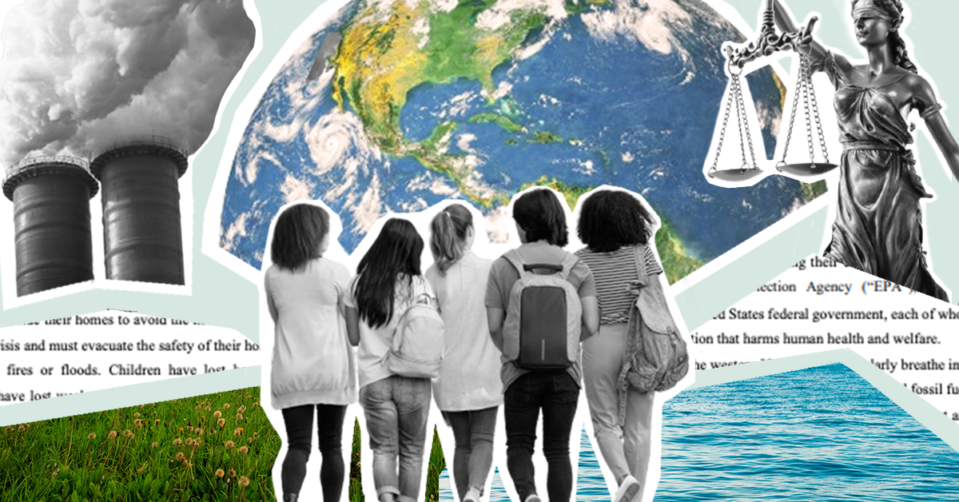A Different Kind of Class: Children Seek Equally Protected Futures
Tatiana Zapata (Legal Fellow) / April 25, 2024

Youth across the globe are increasingly speaking out about climate change and its impacts on their lives. In September, we wrote about some of the legal efforts that youth have brought to protect their rights to a clean and healthful environment. Now there is a new suit, in which young plaintiffs seek a judicial declaration that the U.S. government, including the Environmental Protection Agency (EPA), has denied them equal protection of the law by allowing life-threatening levels of fossil fuel climate pollution in ways that deliberately discriminate against children. Genesis B. v. EPA is the latest climate lawsuit filed on behalf of young plaintiffs by the organization, Our Children’s Trust, in which the youth seek federal court clarification of the standard of judicial review for equal protection cases involving children.1
On December 10th, eighteen Californian children, ranging in ages from 8 to 17, filed the Genesis suit. They seek a declaratory judgment that they are members of a constitutionally protected class subject to invidious discrimination by EPA. According to the youth, EPA discriminates against children “when making decisions about climate pollution” by treating them differently than adults in their cost-benefit analyses, which, they argue, “overtly and expressly” discount “the value of [children’s] lives and their future.”2
The Genesis youth request that the federal district court declare children as a unique and protected class that is different from adults. They ask the court to recognize the physiological and psychological vulnerabilities of children, who are “particularly sensitive to climate harms” and whose exposure to such harms can subject them to “a lifetime of hardship.”3 The youth argue that the Equal Protection Clause prohibits EPA “from imposing significant risks and injury to Children’s well-being for matters beyond their control.”4 Equal protection of the law, as guaranteed by the 5th and 14th Amendments of the U.S. Constitution, dictates that unless there is a legally sufficient reason for the government to treat a class of people differently, similarly situated groups of people should be treated the same under the law. Courts review equal protection challenges to allegedly discriminatory governmental acts under one of three tiers of scrutiny: rational basis, intermediate, or strict scrutiny.
The plaintiffs in the Genesis case acknowledge that the “Supreme Court has not decided what level of judicial scrutiny applies to Children as a class,”5 but they argue that they should be entitled to a heightened level of scrutiny here. The Genesis youth argue that the court should not apply traditional “adult-centric”6 tiers of scrutiny, but should instead analyze “the extent to which [EPA’s] conduct burdens Children’s ability to live and enjoy their lives by imposing on them a lifetime of hardship.”7 This standard, the youth argue, is supported by the Supreme Court’s reasoning, in other contexts, that children are entitled to special consideration where government action imposes lifetime hardships on children for matters beyond their control.8 Should the traditional framework apply to such claims though, the youth argue, EPA’s conduct is subject to strict scrutiny because their fundamental right to equal protection is threatened. Under strict scrutiny, the government “must prove their actions are ‘necessary to further a compelling state interest.’”9 The youth contend further that the defendants cannot satisfy that standard because “climate pollution and dangerous air quality serve no rational, legitimate, important, or compelling government purpose.”10
The Genesis plaintiffs argue that EPA, through its discriminatory discounting of children’s lives, is violating its mandate to protect public health and welfare from air pollution. The agency, the youth argue, is required to make decisions based on the best available climate science, which shows the burdens youth will face if EPA does not act to reduce and ultimately prohibit most climate pollution from fossil fuel emissions by 2050.11 Other constitutional questions raised by the suit include whether the defendants are violating the youth’s due process right to life and to a life-sustaining climate system.
A favorable finding on either of these constitutional claims could have broad implications for childrens’ rights beyond climate advocacy. The first hearing in this case is scheduled for Monday, April 29th, during which the court will hear arguments on the defendants motion to dismiss the case and the plaintiff’s arguments in opposition.
- The Genesis plaintiffs’ arguments mirror those of the young plaintiffs in Juliana v. U.S., who similarly argue that the U.S. government has denied them equal protection of the law that it affords “prior and present generations of adult citizens,” and that, as children, they are a “separate suspect class in need of extraordinary protection” from the government’s deliberate discrimination. Complaint ⁋ 292, 294.
- Genesis Complaint ⁋ 348, 278-306.
- Complaint ⁋ 132.
- Complaint ⁋ 337.
- Complaint ⁋ 131.
- Complaint ⁋ 344.
- Complaint ⁋ 337.
- Plyler v. Doe, 457 U.S. 202 (1982) held unlawful the discriminatory burden imposed by a Texas statute on children of undocumented persons, while Levy v. Louisiana, 391 U.S. 68, (1968) and Weber v. Aetna Cas. & Sur.
Co., 406 U.S. 164 (1972) pertained to rights of children regardless of whether they were born out of wedlock. - Complaint ⁋ 141.
- Complaint ⁋ 328.
- Complaint ⁋ 307-334.
